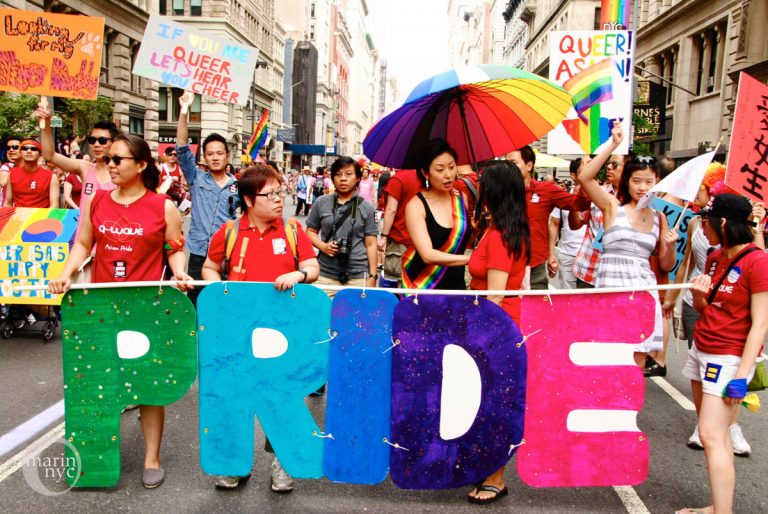 Well, it’s June. And for many LGBT people it’s a month of celebration, of parties, of activism and awareness. In the U.S., President Obama once again officially proclaimed June as Lesbian, Gay, Bisexual, and Transgender Pride Month. Of course, June has been “Gay Pride” month since the Stonewall Riots in June 1969, and there are parades and festivities occurring this month all around the world, from Omaha to London to Tel Aviv to Shanghai. Cities across the globe have cordoned off streets and beaches for the concerts and parties. The parades have become the public arena for corporate floats, aspiring politicians, community activists, churches, and everyday citizens demonstrating for civil rights and social acceptance, as well as those out just for a good time.
Well, it’s June. And for many LGBT people it’s a month of celebration, of parties, of activism and awareness. In the U.S., President Obama once again officially proclaimed June as Lesbian, Gay, Bisexual, and Transgender Pride Month. Of course, June has been “Gay Pride” month since the Stonewall Riots in June 1969, and there are parades and festivities occurring this month all around the world, from Omaha to London to Tel Aviv to Shanghai. Cities across the globe have cordoned off streets and beaches for the concerts and parties. The parades have become the public arena for corporate floats, aspiring politicians, community activists, churches, and everyday citizens demonstrating for civil rights and social acceptance, as well as those out just for a good time.
And then there’s the other side. The drunkenness, the public display of nudity and sexuality, the flaunting of common decency in the name of shock value “because we can”. Many of the events are family-friendly, but many have come out of the seedy, dark underground where practices not really suited for prime time are now being aired defiantly. It’s Mardi Gras with a rainbow flag.
Like a lot of things in our world today, Christians even remotely interested in such events are faced with a dilemma. Do I go? Do I participate? Or is this something that should be completely avoided?
I asked a few of my Christian friends for their opinions, and as expected, received answers ranging all along the spectrum, from adamantly opposed, to strongly supportive, and even apathy and uncertainty in between. Regardless of the value or lack of value in supporting the cause of civil rights, is it appropriate for Christians to associate with these kinds of events and these kinds of people? As one friend quoted the Bible to me, “what partnership does righteousness have with lawlessness; what fellowship has light with darkness?” But as another friend countered, “how else is the light to shine except in darkness? The light shines, and darkness has not overcome it.” But I think even that whole imagery misses the point.
Everyone will have to answer that question for themselves, according to their own motivations and conscience, but I thought it would be helpful to ask that popular question, “What would Jesus do?”
I think everyone will agree that Gay Pride celebrations are generally not for the timid or faint of heart. There are strongly motivated people out there — those advocating their liberty, those voicing opposition, and those just plain ole acting up. And it should go without saying that followers of Jesus probably shouldn’t be active participants in lewdness and debauchery — however your conscience defines those. But large-scale public celebrations — especially this one — are filled with hurting and hungry people. And that to me is the key to solving the dilemma.
Jesus went wherever people needed him. “It is not the healthy who need a physician, but the sick. I have not come for the righteous, but to call sinners to repentance” (Lk 5:30-32). “I have come that they may have life, and have it in abundance” (Jn 10:10).
This motivation drove Jesus to some very questionable places and caused him to associate with certain types of people that the more religious would never even talk to much less hang out with. His behavior and choice of companions so outraged the religious that they called him a drunk and a glutton (Mt 11:19). They accused him of being demon possessed. Why? Because he loved people.
And let’s be clear about one thing here: while Jesus would not have been condoning out-of-control behavior, he was no stranger to parties and enjoying himself. Remember his first miracle? It was at a wedding reception, where celebrating people were busy getting drunk. And what does he do? Give them more wine to celebrate. (John 2). And he was frequently seen at banquets and dinner parties, hanging around tax collectors, corrupt officials, prostitutes. The Pharisees of his day called him on it: how can you associate with such unclean people? Religious people, of any generation, seem to share the same attitude.
But Jesus saw something, he knew something, that they did not. He understood the heart of God.
Would Jesus go to a Gay Pride parade? You bet he would.
He’d use whatever means he could to show people how important they are to the Father. He might march in the parade or ride on one of the floats, waving at the people. I doubt he’d be wearing a feather boa or buttless chaps, but he’d certainly have a booth out on the fair grounds with big signs telling people that God loved them. He’d be shouting into the crowds (in a very undignified way), “Come to me, all you who are weary and heavy laden, and I will give you rest.” He’d say, “Come to me, all who are hungry, and let me give you what you’re seeking. Come to me, all of you who are thirsty, and I will give you water to drink that will fill your souls and overflow out of you to water others.” He’d be reaching out, with arms extended, “You who are tired of church, you who have been damaged by religion, come to me. Let me love you, let me show you who God really is.”
Jesus loved people, and he’d go wherever the people were. To love them. To bless them. To help them. And simply to enjoy their company.
Of course he’d be at Gay Pride celebrations — where so many Gay and Lesbian and Bisexual and Transgender people have been rejected by our religious organizations, our churches, hurt by family, told they are hated by God, told they are going to hell. Is there any other group of people more needing of the love and acceptance of Jesus?
Would he be among the conservative church goers there, the Westboro crowd, holding up protest signs that say “Fags go to Hell”, or hurling insults at those dressed in feather boas or sexually-explicit costumes? Would he be among those throwing stones? Did he EVER do that in the Gospels? No.
Today, at any Gay Pride parade or picnic he went to, he’d walk up to such “scandalous” people, wrap his arms around them, kiss them on the cheek, and say “You are SO loved by the Father.” Some people would reject him, now just as they did 2000 years ago. But those who hunger for a relationship with God would hug him back, and follow him to some grassy picnic area where he’d tell them stories about how the Kingdom of God is made up of people such as themselves.
 And from such people — the regular joes in jeans and t-shirts drinking their beer, the militant activists venting outrage at oppression, the same-sex parented families wanting to raise their kids in an accepting world, the male dancers in tighty-whities, the biker dykes, the rodeo cowboys, the drag queens with giant hair and 4 inch heels, the bears, the twinks, the lipstick lesbians, the bisexuals fighting for a place at the table in either community, the questioning and uncertain boys and girls trying to sort out who they are and what they want, the transgender men and women rebuilding their lives to match their true identities, the confident, the weak, the strong, the broken, the whole, the off-balanced, the healthy and those struggling for recovery — from all these people he would raise up followers who would know the grace of God and see a face of God that those who grew up in the church may never see and may never experience.
And from such people — the regular joes in jeans and t-shirts drinking their beer, the militant activists venting outrage at oppression, the same-sex parented families wanting to raise their kids in an accepting world, the male dancers in tighty-whities, the biker dykes, the rodeo cowboys, the drag queens with giant hair and 4 inch heels, the bears, the twinks, the lipstick lesbians, the bisexuals fighting for a place at the table in either community, the questioning and uncertain boys and girls trying to sort out who they are and what they want, the transgender men and women rebuilding their lives to match their true identities, the confident, the weak, the strong, the broken, the whole, the off-balanced, the healthy and those struggling for recovery — from all these people he would raise up followers who would know the grace of God and see a face of God that those who grew up in the church may never see and may never experience.
Not everybody at Gay Pride celebrations is hurt or damaged, of course. And only a small percentage of those gathered at these events will be acting in outrageous ways. Many people will be there just for the festivities and entertainment. Many of these will be fellow believers — gay and straight. And Jesus would be sitting at their table, sharing hamburgers with them, blessing them, listening to their stories and encouraging them. He’d laugh with them, cry with them, and remind them that he’s always with them and will never abandon them.
Should a Christian, gay or straight, attend Gay Pride events? That, of course, depends on your motive for being there. If you’re there to throw stones, or to hold up signs and shout protests through bullhorns, it’s best if you stay home. The love of God is not reflected in your actions. The pain you’re inflicting and the division you’re trying to cause do not reflect the heart of Jesus. But if you’re there to show love, to support, to encourage, to speak life into people, then by all means, Go!
When I think about Jesus, any question of whether it’s appropriate or right for a person of faith to go to Pride events melts away. People are there. So the Spirit of God is there. All we need to ask ourselves — all we should be imitating in our own lives — is What would Jesus Do?
[box type=”bio”]
 STEVE SCHMIDT serves on the pastoral staff of Expressions Church in Oklahoma City. He is a graduate of the seminary at Oral Roberts University in Tulsa, OK, and holds two masters degrees in Biblical Literature and Divinity. He did his doctoral research at the Hebrew University of Jerusalem and at the Jewish Theological Seminary of America in New York. He blogs at CafeInspirado.com, and you can always find him skulking on Facebook.
STEVE SCHMIDT serves on the pastoral staff of Expressions Church in Oklahoma City. He is a graduate of the seminary at Oral Roberts University in Tulsa, OK, and holds two masters degrees in Biblical Literature and Divinity. He did his doctoral research at the Hebrew University of Jerusalem and at the Jewish Theological Seminary of America in New York. He blogs at CafeInspirado.com, and you can always find him skulking on Facebook.
[/box]



